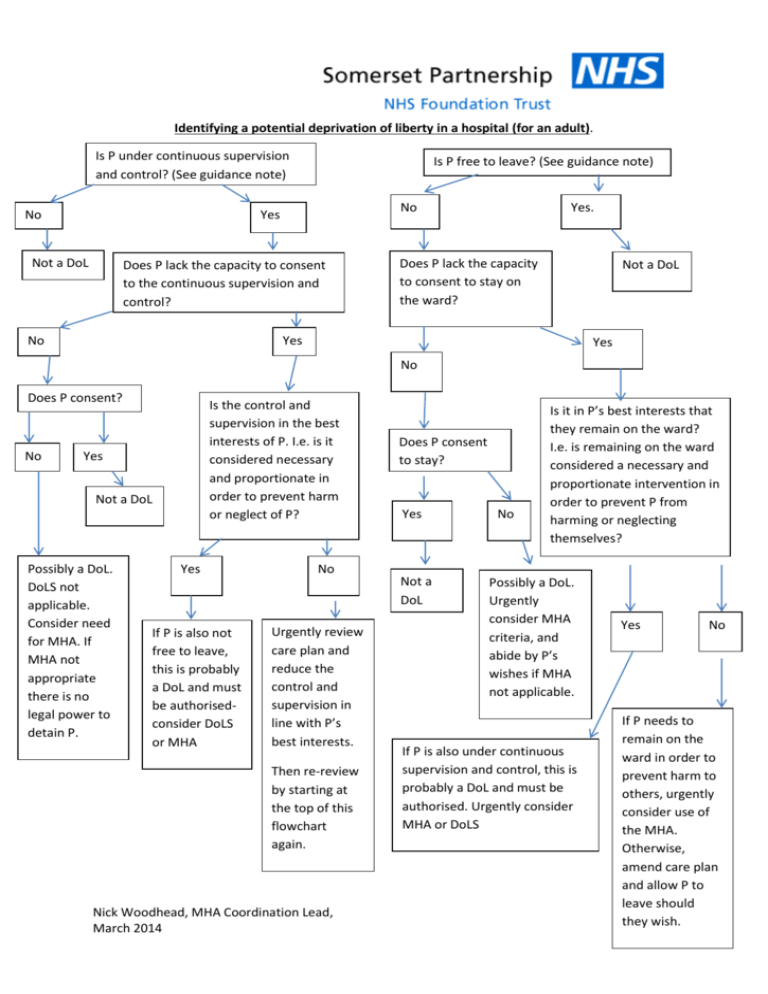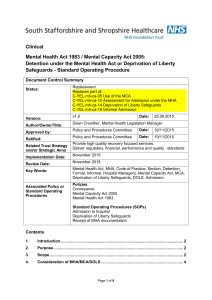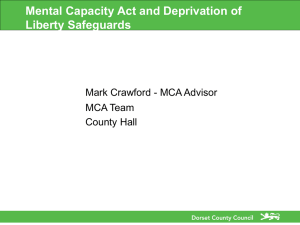Identifying a potential deprivation of liberty in a hospital
advertisement

Identifying a potential deprivation of liberty in a hospital (for an adult). Is P under continuous supervision and control? (See guidance note) No Is P free to leave? (See guidance note) No Yes Not a DoL Does P lack the capacity to consent to the continuous supervision and control? Yes. Does P lack the capacity to consent to stay on the ward? Not a DoL Yes No Yes No Does P consent? No Is the control and supervision in the best interests of P. I.e. is it considered necessary and proportionate in order to prevent harm or neglect of P? Yes Not a DoL Possibly a DoL. DoLS not applicable. Consider need for MHA. If MHA not appropriate there is no legal power to detain P. Yes If P is also not free to leave, this is probably a DoL and must be authorisedconsider DoLS or MHA No Urgently review care plan and reduce the control and supervision in line with P’s best interests. Then re-review by starting at the top of this flowchart again. Nick Woodhead, MHA Coordination Lead, March 2014 Does P consent to stay? Yes Not a DoL No Is it in P’s best interests that they remain on the ward? I.e. is remaining on the ward considered a necessary and proportionate intervention in order to prevent P from harming or neglecting themselves? Possibly a DoL. Urgently consider MHA criteria, and abide by P’s wishes if MHA not applicable. If P is also under continuous supervision and control, this is probably a DoL and must be authorised. Urgently consider MHA or DoLS Yes No If P needs to remain on the ward in order to prevent harm to others, urgently consider use of the MHA. Otherwise, amend care plan and allow P to leave should they wish. Guidance note to accompany the Flowchart “Identifying a potential deprivation of liberty in a hospital” The Supreme Court in March 2014 provided a new definition of ‘deprivation of liberty’. The new definition must now be applied- the use of any other definition or the exercise of any personal or professional discretion is highly likely to be unlawful. There are two parts to the new definition, and both must exist together for a situation to be a deprivation of liberty. If a person is subject to continuous supervision and control AND they are not free to leave, then they are deprived of liberty and, if the person is unable or unwilling to consent to their situation, this should either be authorised (by the MHA, DoLS or via an order from the Court of Protection) or the person’s care should be changed immediately to either reduce the level of supervision and control or to allow them to leave should they wish. It is important to understand that if a person lacks capacity to consent to the supervision/control and inability to leave they may still be deprived of liberty even if they are ‘compliant’ and making no attempt to leave whatsoever. The Supreme Court said ‘A gilded cage is still a cage’ Definitions. Explanations Best Interests. Only of relevance when a patient lacks the capacity to consent to a treatment. Patients with capacity are responsible for their own ‘best interests’ and are able to make ‘unwise decisions’ with which professionals may not agree. When it is established that a patient lacks the capacity to make a decision, and we are making a decision for them, we must act in their best interests. The Code of Practice to the Mental Capacity Act (MCA) says: “Section 4 of the Act explains how to work out the best interests of a person who lacks capacity to make a decision at the time it needs to be made. This section sets out a checklist of common factors that must always be considered by anyone who needs to decide what is in the best interests of a person who lacks capacity in any particular situation. This checklist is only the starting point: in many cases, extra factors will need to be considered. When working out what is in the best interests of the person who lacks capacity to make a decision or act for themselves, decision-makers must take into account all relevant factors that it would be reasonable to consider, not just those that they think are important. They must not act or make a decision based on what they would want to do if they were the person who lacked capacity.” (Paras 5.6 and 5.7) Consent. The voluntary and continuing permission of a patient to be given a particular treatment, based on a sufficient knowledge of the purpose, nature, likely effects and risks of that treatment, including the likelihood of its success and any alternatives to it. Permission given under any unfair or undue pressure is not consent. Patients who lack the capacity to consent cannot consent- compliant acceptance of a treatment or intervention is NOT consent. Nick Woodhead, MHA Coordination Lead, March 2014 Continuous supervision and control. Sadly not defined in law or in case law. The Supreme Court in March 2014 said “I believe that we should err on the side of caution in deciding what constitutes a deprivation of liberty.” Therefore in situations where you are unsure whether or not you are providing ‘continuous supervision and control’, assume that you are and, if the person is also not free to leave, either issue an urgent DoLS authorisation, or request a MHA assessment. It may help to remember the European Court of Human Rights decision in Bournewood (2004)- the Court observed that the hospital’s health care professionals assumed full control of the liberty and treatment of a vulnerable incapacitated individual solely on the basis of their own clinical assessments completed as and when they considered fit. While the Court did not question the good faith of those professionals or that they acted in what they considered to be the applicant’s best interests, the very purpose of procedural safeguards was to protect individuals against any misjudgement or professional lapse. DoL- Deprivation of liberty. Not to be confused with; DoLS- Deprivation of Liberty Safeguards- a legal framework within the Mental Capacity Act which authorises the deprivation of liberty of a person in a hospital or care home when the person lacks the capacity to consent to stay and to be subject to continuous supervision and control. Free to leave. Again not defined in law or case law. Importantly whether or not P is trying to leave is irrelevant. Also irrelevant are the risks which the person would pose to themselves if they left. Ask yourself ‘If this person tried to leave the ward, would we stop them?” If the answer is yes, AND the person is subject to continuous supervision and control (see above), then a deprivation of liberty is probably occurring and must be authorised. Lacking capacity to consent. When it comes to assessing a person’s capacity to consent to admission to hospital ‘it is not necessary for the person to comprehend every detail of the issue’ (Macur J in LBL v RYJ [2010] EWHC 2664), but rather that they are able to comprehend and weigh the salient details relevant to the decision. It is suggested that, in order to consent to admission, a person must be able to understand and weigh up the following points (where relevant): (1) that the person is being admitted to hospital to receive care and treatment for a mental disorder; (2) the nature of the care and treatment – i.e. that it may include varying levels of supervision (including supervision in the community), use of physical restraint and the prescription and administration of medication to treat the mental disorder (3) that staff at the hospital may be entitled to carry out property and personal searches; Nick Woodhead, MHA Coordination Lead, March 2014 (4) that the person may need to seek permission of the nursing staff to leave the hospital, and, until the staff at the hospital decide otherwise, will only be allowed to leave under supervision; (5) that if the person left the hospital without permission and without supervision, the staff would take steps to find and return them, including contacting the police. (6) that if they decide to leave that they might nonetheless be subject to an application made under the statutory holding power under section 5 of the MHA so that they might not in fact be able to leave when they wanted to if those treating them thought they were too mentally unwell to be allowed to leave. This list is based on the findings in A PCT v LDV (2013). MCA- The Mental Capacity Act 2005 MHA- The Mental Health Act 1983 as amended by the Mental Health Act 2007. P. For the purposes of this document ‘P’ stands for the person who may or may not be deprived of liberty. In some places in the flowchart ‘P’ may have capacity to make their own decisions. This is slightly different to the definition of ‘P’ used by The Court of Protection where ‘P’ is: “any person (other than a protected party) who lacks or, so far as consistent with the context, is alleged to lack capacity to make a decision or decisions in relation to any matter that is the subject of an application to the court.”(Court of protection Fees Order 2007, paragraph 2). Nick Woodhead, MHA Coordination Lead, March 2014 Once a Potential Deprivation of Liberty has been Identified- Which Legal Framework Should be Considered? Status of Patient Legal framework options Consenting to admission and treatment The patient has the capacity to understand the implications of hospital admission and treatment and is validly consenting. ‘Valid’ means that they are not being placed under undue pressure to agree to the admission. Undue pressure might include the offer of admission being: “I’d prefer you to come in informally, but if you won’t we will use the Mental Health Act.” Consent given in such circumstances is probably not valid. The MHA Code of Practice states: “The threat of detention must not be used to induce a patient to consent to admission to hospital or to treatment (and is likely to invalidate any apparent consent).” (para 4.12) Possibly no legal process required. Informal admission is usually appropriate. S131 of the MHA: “Informal admission of patients (1) Nothing in this Act shall be construed as preventing a patient who requires treatment for mental disorder from being admitted to any hospital or registered establishment in pursuance of arrangements made in that behalf and without any application, order or direction rendering him liable to be detained under this Act, or from remaining in any hospital or registered establishment in pursuance of such arrangements after he has ceased to be so liable to be detained.” However, The MHA Code of Practice says: “4.10(…) this should not be regarded as an absolute rule, especially if the reason for considering admission is that the patient presents a clear danger to themselves or others because of their mental disorder. 4.11 Compulsory admission should, in particular, be considered where a patient’s current mental state, together with reliable evidence of past experience, indicates a strong likelihood that they will have a change of mind about informal admission, either before or after they are admitted, with a resulting risk to their health or safety or to the safety of other people.” Nick Woodhead, MHA Coordination Lead, March 2014 Status of Patient Legal framework options Not consenting to admission. The patient has the capacity to consent to admission, and is refusing to be admitted or (if already an inpatient) to remain in hospital. If the patient needs to be in hospital for treatment of mental disorder, then the best option is to carry out a Mental Health Act assessment. Section 5(2) or 5(4) may be applicable if the patient is already an inpatient. The Mental Capacity Act does not apply when a person has the capacity to make their own decisions. DoLS cannot be applied to a person with capacity. Unless the patient is made subject to the Mental Health Act (or unless temporarily restrained using Common Law powers) there is no power other than persuasion to take them to hospital or to make them stay in hospital or to make them accept treatment. Common Law is something which may be relied upon in an unpredicted emergency situation when a failure to intervene would result in potential harm to the patient or others. Common law is not something to incorporate into a care plan- if there is a known risk that compulsory powers will be needed, then consideration should be given to carrying out a MHA assessment. Nick Woodhead, MHA Coordination Lead, March 2014 Status of Patient Legal framework options Lacks capacity to consent to admission, and appears to be objecting to admission. The concept of objection is vital here. If the patient is objecting to their admission or treatment for mental disorder, then DoLS cannot apply. The patient is considered to be ineligible for a DoLS authorisation. If a patient lacks the capacity to consent to admission it is quite difficult to know whether or not they are objecting. How can someone object to something they do not understand? However, ‘objecting’ is described in the MHA Code of Practice: “whether a patient is objecting has to be considered in the round, taking into account all the circumstances, so far as they are reasonably ascertainable. The decision to be made is whether the patient objects to treatment – the reasonableness of that objection is not the issue. In many cases the patient will be perfectly able to state their objection. But in other cases doctors and AMHPs will need to consider the patient’s behaviour, wishes, feelings, views, beliefs and values, both present and past, so far as they can be ascertained. If there is reason to think that a patient would object, if able to do so, then the patient should be taken to be objecting.” (Para 4.19.) If the admission to hospital is in order primarily to treat a mental disorder, then an assessment under The Mental Health Act is required. To work out whether or not the admission is primarily to treat a mental disorder, when physical treatment is also required, ask yourself: “If no physical treatment were required, would we be admitting this person to treat their mental disorder?” If the answer is yes, then a Mental Health Act assessment is required. If the answer is no, then the Mental Health Act cannot apply, and a DoLS authorisation should be sought. In some cases neither the MHA nor DoLS will be applicable. For example: The following principle from the Supreme Court’s judgement should also be borne in mind: “Because of the extreme vulnerability of people like P, MIG and MEG, I believe that we should err on the side of caution in deciding what constitutes a deprivation of liberty in their case. Nor should we regard the need for (the imposition of a legal framework) as in any way stigmatising of them or of their carers. Rather, (it is) a recognition of their equal dignity and status as human beings like the rest of us.”(para 57) Nick Woodhead, MHA Coordination Lead, March 2014 The result of a MHA assessment may be that the doctors decide that the patient is potentially eligible to be detained, but they (the doctors) wish to exercise their discretion and not sign medical recommendations. Or, The Nearest Relative may object to the imposition of a S3. Or, A Tribunal has discharged the patient and nothing significant has changed since that discharge. Or, The AMHP may decide to exercise discretion and not sign an application despite having valid medical recommendations. In these scenarios it may be possible to ask the Court of Protection to invoke its inherent jurisdiction and grant an Order authorising a deprivation of liberty. Status of Patient Legal framework options Lacks capacity to consent admission, and is not objecting to admission. (Sometimes called ‘the compliant incapacitated patient.’) In this situation it may be possible to apply The Mental Health Act, a DoLS authorisation or possibly even an Order from The Court of Protection. It may sometimes be possible to apply any of these and be acting lawfully ( i.e. sometimes any of the available legal frameworks may be ‘correct’- and none would clearly be ‘wrong’) The patient lacks the capacity to consent to be in hospital, does not appear to be objecting, but is under constant supervision and control and is not free to leave (i.e. would be stopped from leaving if they tried). One judge has said that decision makers need to decide which legal framework is ‘less restrictive’, and that the ‘stigma’ attached to being sectioned somehow makes the Mental Health Act a more restrictive option than a DoLS authorisation. This is a controversial ruling. To help the decision-making process here is a comparison of the safeguards provided by The Mental Health Act as opposed to those of the DoLS scheme: MHA safeguards: Nick Woodhead, MHA Coordination Lead, March 2014 Prescribed time limits to detention. Automatic access (without the need for lodging an appeal) to regular court reviews of detention via the Tribunal service. Right to appeal to a Tribunal or to the hospital managers for discharge. Nearest Relative power of discharge and of blocking the imposition of a Section 3. Statutory right to an Independent Mental Health Advocate. Consent to treatment rules (including the statutory need to involve a Second Opinion Appointed Doctor in certain situations) MHA Commissioners appointed by CQC have the right to carry out unannounced inspections, to access patients’ notes and interview patients in private. Appropriate treatment must be available for people detained for treatment. DoLS safeguards: An authorisation may last no longer than 12 months before a fresh assessment is carried out. A person subject to an authorisation will have a ‘representative’ appointed. The representative can appeal to the Court of Protection to review the authorisation. In some situations an Independent Mental Capacity Advocate must become involved. It is widely accepted that the safeguards provided by the Mental Health Act are much more robust than those within the Deprivation of Liberty Safeguards. Some people have suggested that the lack of an automatic access to a Court review means that the DoLS scheme is incompatible with The Human Rights Act. It should also be noted that the House of Lords concluded in March 2014:“The (DoLS) provisions are poorly drafted, overly complex and bear no relationship to the language and ethos of the Mental Capacity Act. (…)The only appropriate recommendation in the face of such criticism is to start again. We therefore recommend a comprehensive review of the Deprivation of Liberty Safeguards with a view to replacing them with provisions that are compatible in style and ethos to the rest of the Mental Capacity Act.” Decision-makers should also remember that the DoLS scheme provides no explicit powers to: Nick Woodhead, MHA Coordination Lead, March 2014 Convey a person to hospital Transfer a person between hospitals Grant leave Return a person if they leave the premises. The Mental Health Act does explicitly provide all these powers. Nick Woodhead, MHA Coordination Lead, March 2014






